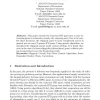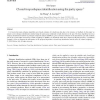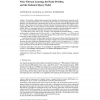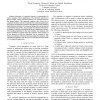1599 search results - page 16 / 320 » Algorithms for Parity Games |
IPL
2010
14 years 9 months ago
2010
We study the problem of learning parity functions that depend on at most k variables (kparities) attribute-efficiently in the mistake-bound model. We design a simple, deterministi...
SEAL
1998
Springer
15 years 3 months ago
1998
Springer
Abstract. This paper extends the N-person IPD game into a more interesting game in economics, namely, the oligopoly game. Due to its market share dynamics, the oligopoly game is mo...
AUTOMATICA
2006
14 years 11 months ago
2006
It is known that many subspace algorithms give biased estimates for closed-loop data due to the existence of feedback. In this paper we present a new subspace identification metho...
134
click to vote
STOC
2000
ACM
15 years 3 months ago
2000
ACM
We describe a slightly subexponential time algorithm for learning parity functions in the presence of random classification noise, a problem closely related to several cryptograph...
ICARCV
2008
IEEE
15 years 5 months ago
2008
IEEE
—Detection of spurious features is instrumental in many computer vision applications. The standard approach is feature based, where extracted features are matched between the ima...




